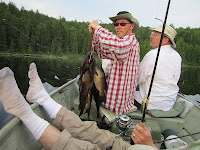 |
| The river we could not best. |
 |
| With one of two stringers from a full day. |
A few friends and I just returned from a week in NW Ontario. It went by way too fast. Up near where 90oW crosses the map, just north of Minnesota’s Superior National Forest, we lost track of time and immersed ourselves in boreal beauty. A stone's throw west of Kakabeka Falls, our days were filled with fishing and fun, lakes and sun, a lot of beer and a lot of laughs. They zipped by like so many mosquitoes buzzing about our cabin door.
I caught some of the biggest fish I’ve ever hooked into on lakes that were pristine and clear, teeming with the Northwoods trifecta: Northern Pike, Smallmouth Bass, and the highly prized Walleye. Some real whoppers!
 Aside from the fishing and friendship, it is the immense boreal forest ecosystem that really establishes the sense of place. With potential for moose, black bear, lynx, fox, and wolf around every turn, not to mention hundreds of varieties of ducks, geese, owl, and other fowl, it is a nature-lover’s paradise. Of course there are also the horseflies, black flies, biting flies, no-see-ums, ticks, leeches, and buzzing hordes of mosquitos. But with those you just deal; stay calm and carry on.
Aside from the fishing and friendship, it is the immense boreal forest ecosystem that really establishes the sense of place. With potential for moose, black bear, lynx, fox, and wolf around every turn, not to mention hundreds of varieties of ducks, geese, owl, and other fowl, it is a nature-lover’s paradise. Of course there are also the horseflies, black flies, biting flies, no-see-ums, ticks, leeches, and buzzing hordes of mosquitos. But with those you just deal; stay calm and carry on.  | |||
| Our fearless leader, Curly. |
Formed after the last Ice Age, about 10,000 years ago, the biodiversity that we see now only started to shape up around 5,000 years ago. Not very long in terms of geographic maturation. As much as it is loved, it has also been threatened by unsustainable logging practices and parcelization, among other things.
 |
| A neighbor visiting the dock at Rancho Relaxo. |
In 2010 Canadian environmentalists and logging companies struck an historic deal: the Canadian Boreal Forest Agreement. The CBFA established a moratorium on logging across nearly 29 million hectares of forest land, an area about twice the size of Germany. About 1.2 billion acres were protected overall in an effort to save endangered caribou and create a sustainable logging system across all seven provinces. Doug Struck wrote a great piece about it for the Pew Trust magazine in November of that year.
 |
| Boreal shoreline. |
Logging practices can be harsh, and not just in BC. When I crammed into my friend Matt's Toyota 4x4 with four other guys to drive about 50 miles into the bush to find a somewhat mythical ("killer walleye!") lake we drove by some ugly clear-cut areas. Piles of slash were stacked on the roadside, set to be burned during the cold winter months.
What was a less evident but highly crucial part of the process were the scores of summer-job youth who brave heat, bugs, and bears to plant jack pine at a rate of 2:1 for every tree harvested. This is cause for some hope. But it's likely a limited effort in the grand scheme.
We found this out by talking to a local friend, Willy, who has been working for the logging company by maintaining a bush road for decades. And I tell you what, never a finer bush road will you see than after Willy gets through with a days work in the grader. Smooth traveling!
Though the government seems to be back-tracking in terms of ecological intelligence, Ontario it is still a beautiful vacation destination... for now. Get there while the getting is good! I hope to go back many times.
Until next time, however, I will dream of the 31" pike and the 19.5" smallmouth I caught floating down "Lunker Alley" on the lake we call Horseshoe. One modest trapper's cabin sat obscured by trees off of its shore and not a single other boater was there to disturb us.
"I don't go fishing to catch fish," says our guide, friend and native Wisconsinite, Mark Winkelman. "We go fishing to get away from people." Just my kind of guy. Thanks, Mark!
 |
| Logging slash in an area of clear-cut forest. |
We found this out by talking to a local friend, Willy, who has been working for the logging company by maintaining a bush road for decades. And I tell you what, never a finer bush road will you see than after Willy gets through with a days work in the grader. Smooth traveling!
Though the government seems to be back-tracking in terms of ecological intelligence, Ontario it is still a beautiful vacation destination... for now. Get there while the getting is good! I hope to go back many times.
 |
| Chatting with Willy, the Roadmaster. |
"I don't go fishing to catch fish," says our guide, friend and native Wisconsinite, Mark Winkelman. "We go fishing to get away from people." Just my kind of guy. Thanks, Mark!
Fishin' -- and even some catchin'! Thanks for sharin'.
ReplyDeleteThanks for reading!
ReplyDelete